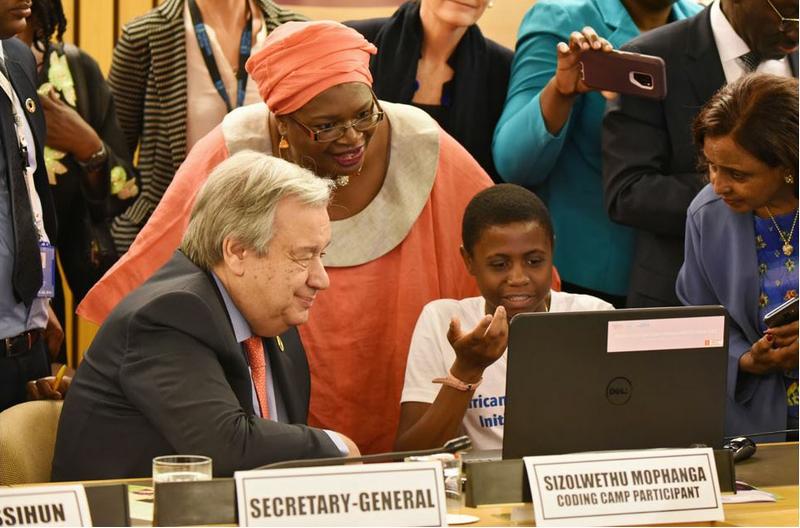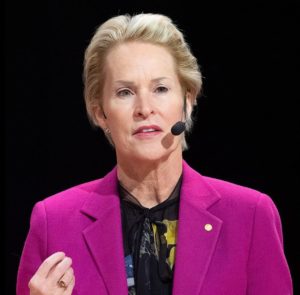Women, Girls Excel at Science, Tech, Engineering, Math

Coding camp participant Sizolwethu Mophanga shows UN Secretary-General António Guterres what she has learned, February 9, 2019, Addis Ababa, Ethiopia. (Photo by Kennedy Okoth / UN Women) Posted for media use.
By Sunny Lewis
NEW YORK, New York, February 12, 2019 (Maximpact.com News) – When Rebecca Azanaw, 17, got the news that she would have a meeting with the UN Secretary-General, not even looming semester exams could keep her from the opportunity, offered in connection with the International Day for Women and Girls in Science, February 11.
Azanaw was one of more than 80 girls who took part in the first coding camp of the African Girls Can Code Initiative last September.
On February 9, she and 10 other girls from the program met with UN Secretary-General António Guterres on the sidelines of the African Union Summit in Addis Ababa, Ethiopia, to share their experiences and ambitions.
“I am very proud that I got to be one of the first African girls to do the camp. That was a chance for me to start coding seriously,” Azanaw said.
Ruth Mulu, 18, who also took part in the coding program, said meeting UN Secretary-General Guterres was overwhelming.
With his encouragement, Mulu said the coding camp empowered her to help other girls see through the stereotype that computer coding is a man’s job.
Today Mulu is teaching other girls in her school to code and changing the mindsets of friends and family members. Since attending the coding camp, she has designed a digital logo using her coding skills that is now being used by her school for its annual celebration.
“We need more and more girls taking technology and science courses,” said Secretary-General Guterres. “I enjoyed meeting these impressive students in Ethiopia and learning about their innovative coding projects.”
“If more girls and women are not joining these professions, the power relations of the world will remain very male dominated,” said Guterres.
The African Girls Can Code Initiative is a four-year project led by the International Telecommunications Union (ITU), the African Union Commission, and UN Women Ethiopia. It is bringing together girls and young women from all over the African continent to spark their interest in Information and Communication Technology (ICT) as a career path.
Across Africa, women and girls are benefiting from Science, Technology, Engineering and Mathematics (STEM) camps that are organized by the Working to Advance STEM Education for African Women Foundation (WAAW).
Unoma Okorafor, the founder of WAAW Foundation, believes that learning science and technology should be fun, so the foundation engages girls with creative projects in STEM subjects. The initiative has received numerous awards for its approach, and the WAAW Foundation has been nominated as one of the 2019 World Summit on the Information Society (WSIS) Prize finalists for capacity building.
But, of course, women and girls not only in Africa but across the world are educating themselves, entering the STEM professions and chalking up important achievements.

Dr. Frances Arnold speaks during the Nobel press conference in Stockholm, Sweden, December 2018 (Photo by Bengt Nyman) Creative Commons license via Wikipedia.
Frances Arnold, Nobel Prize Winner in Chemistry
Frances Hamilton Arnold, an American chemical engineer, was awarded the 2018 Nobel Prize in Chemistry for pioneering the use of directed evolution to engineer enzymes.
She received a one-half share of the prize, with the other half jointly awarded to American biologist George Smith and British biochemist Gregory Winter “for the phage display of peptides and antibodies.”
Dr. Arnold is the fifth woman to receive the Nobel Prize in Chemistry in its 117 years of existence, and the first American woman. She is the Linus Pauling Professor of Chemical Engineering, Bioengineering and Biochemistry at the California Institute of Technology (Caltech).
At Caltech, Arnold runs a laboratory that studies directed evolution and its applications in environmentally-friendly chemical synthesis and green/alternative energy, including the development of highly active enzymes and microorganisms to convert renewable biomass to fuels and chemicals.
Arnold has evolved bacteria to produce the biofuel isobutanol, and she has used directed evolution to design enzymes that can be used as environmentally-friendly alternatives to industrial chemical synthesis procedures.
A former student of hers has used directed evolution to evolve an enzyme to produce a diabetes drug.
Among her many honors, Arnold was the first woman to be elected to all three National Academies in the United States: the National Academy of Engineering (2000), the National Academy of Medicine (2004), and the National Academy of Sciences (2008).
Anne Pihlanto Works Towards Food Security
A woman is the principal scientist in a ground-breaking new project funded by the European Union. Dr. Anne Pihlanto from the Natural Resources Institute Finland and her team will explore the potential of utilizing microorganisms in plants and animals to improve food security and promote sustainable food production.
The project, called SIMBA (Sustainable Innovation of Microbiome Applications in Food System), will explore the value and potential of microbiomes such as bacteria, fungi, and viruses that inhabit a particular environment. These communities play a vital role in the productivity and health of plants and animals.
Exploitation of the communities in species used as food sources could lead to the creation of healthier, more stable and secure crops and livestock.
At the recent SIMBA kick-off meeting in Helsinki in mid-December, Dr. Pihlanto said, “Recent research has indicated the huge impact microbiomes have on our lives. This makes SIMBA a very exciting project to be involved in.”
“The project will have far-reaching impacts, not only contributing to improved food security, but the development of sustainable diets and novel fermented products are also expected to potentially function as a cure for type 2 diabetes,” Pihlanto said.
Yukiko Gotoh Investigates Stem Cells
STEM has at least two meanings. It means Science, Technology, Engineering and Mathematics when referring to education, and it also means stem cells, special human cells that have the ability to develop into many different cell types, from muscle cells to brain cells and can repair damaged tissues.
In Japan, Professor Yukiko Gotoh explores stem cells. She has a dual appointment at the University of Tokyo – in the Graduate School of Pharmaceutical Sciences and the International Research Center for Neurointelligence.
Understanding how the brain first develops different cell types helps researchers imagine how to design treatments for neurodegenerative conditions, such as Alzheimer’s disease, Parkinson’s disease, and amyotrophic lateral sclerosis (ALS or Lou Gehrig’s disease), when those cells are damaged.
Dr. Gotoh runs a laboratory that has focused on identifying the mechanisms and logic that underlie the regulation of neural stem-progenitor cell fate both during embryonic brain development and in adulthood. She also works toward understanding “the relevance of these processes to neurodevelopmental disorders.”
Today, Dr. Gotoh released a study that identifies two distinct control mechanisms in the developmental transition of undifferentiated stem cells into healthy brain cells. This fundamental research using mice may inform regenerative medicine treatments for neurodegenerative diseases and spinal cord injuries, in the future.
United Nations Supports Gender Parity in the Lab
In a message for the International Day for Women and Girls in Science, Phumzile Mlambo-Ngcuka, executive director of UN Women, and Audrey Azoulay, director-general of UNESCO, highlight the importance of encouraging a new generation of female scientists to tackle to major challenges of our time.
Recent studies suggest that 65 percent of children entering primary school today will have jobs that do not yet exist. While more girls are attending school than before, girls are under-represented in STEM subjects in many settings and they appear to lose interest in STEM subjects as they reach adolescence.
Debunking the myths that girls do not like the sciences and other gender stereotypes, along with investment in teacher training, gender-responsive technology and innovation, can reverse these trends.
With Sustainable Development Goal 9, part of the Global Goals that world leaders agreed to in 2015 with a deadline of 2030, countries around the world have pledged to “build resilient infrastructure, promote inclusive and sustainable industrialization and foster innovation,” Mlambo-Ngcuka and Azoulay point out in their message.
Yet, “…as the Fourth Industrial Revolution starts, women still have less than two-thirds of the economic opportunity that men have. The jobs of the future will be driven by technology and innovation, and if the gender divide in Science Technology Engineering and Mathematics is not bridged soon, the overall gender gap is likely to widen,” write Mlambo-Ngcuka and Azoulay.
Klaus Schwab, founder of the World Economic Forum, described this latest shift in his 2016 book “The Fourth Industrial Revolution,” writing, “Ubiquitous, mobile supercomputing. Intelligent robots. Self-driving cars. Neuro-technological brain enhancements. Genetic editing.”
As industries prepare to adapt to these disruptive changes, tackling gender gaps could unlock new opportunities for growth.
In an accompanying 2016 report, “The Industry Gender Gap: Women and Work in the Fourth Industrial Revolution,” the World Economic Forum (WEF) writes, “Female talent remains one of the most underutilized business resources, either squandered through lack of progression or untapped from the onset. Although women are, on average, more educated than men globally and now participate more fully in professional and technical occupations than 10 years ago, as of today, their chances to rise to positions of leadership are only 28% of those of men.”
“The moral case for gender equality has, in the most part, been won,” WEF writes in “The Industry Gender Gap,” “The business and economic case is also increasingly understood. The Fourth Industrial Revolution now presents an unprecedented opportunity to place women’s equal participation in the workplace at the heart of preparations for the shifts to come.”
Featured Image: Students attend a Chemistry laboratory class at the State Vocational School – Depok in Indonesia’s Yogyakarta Province on the island of Java. The class is part of the Asian Development Bank’s Vocational Education Strengthening Project (INVEST) in Indonesia, July 18, 2012 (Photo by Asian Development Bank) Creative Commons license via Flickr.
